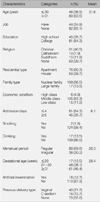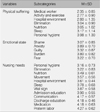Abstract
Purpose
This study was to identify the relationship between physical suffering, emotional state, and nursing needs of pregnant women in preterm labor and the difference depending on general characteristics.
Methods
The participants in this descriptive survey, selected by convenience sampling, were 126 pregnant women who were hospitalized after being diagnosed with preterm labor at 3 university hospitals.
Results
The level of personal hygiene was assessed in physical suffering, level of fear was assessed by the emotional state, and level of perterm labor was assessed by the nursing cares. In the analysis, physical suffering, emotional state, and nursing needs in the subjects all showed a significantly positive correlation. Differences in physical suffering, emotional state, and nursing needs depending on general characteristics were as follows: age, job, family type, economic condition, smoking, drinking admission days, previous delivery type, and artificial insemination.
Figures and Tables
References
1. Ahn Y.L. Physical discomforts and sexual life pattern of women with hysterectomy. 1999. Seoul: Seoul National University;Unpublished master's thesis.
2. Coster-Schulz M.A., Mackey M.C. The preterm labor. Clin Nurs Res. 1998. 7(4):335–362.
3. Cunningham F.G., Gant N.F., Leveno K.J., Gllstrap L.C. III, Hauth J.C., Wenstrom K.D. Williams obstetrics. 2001. 21st ed. New York: McGraw-Hill Co.
4. Doyan J. Role of anxiety and depression in the onset of spontaneous preterm labor. Am J Epidemiol. 2002. 155(4):293.
5. Freston M.S., Young S., Calboun S., Fredericksen T., Salinger L., Malchodi C., Egan J.F. Responses of pregnant women to potential preterm labor symptoms. J Obstet Gynecol Neonatal Nurs. 1997. 26(1):35–42.

6. Gennaro S., Hennessy M.D. Psychological and physiological stress: Impact on preterm labor. J Obstet Gynecol Neonatal Nurs. 2003. 32(5):668–675.
7. Gupton A., Heaman M., Ashcroft T. Bed rest from the perspective of the high-risk pregnant woman. J Obstet Gynecol Neonatal Nurs. 1997. 26(4):423–430.

8. Han K.R. Nursing needs of women experiencing premature labor. 1995. Seoul: Ewha Womans University;Unpublished master's thesis.
9. Heo H., Hwang J.Y., Kim D.G., Lee H.J., Sim J.C., Yang H.S. A clinical study of pregnancy and delivery in pregnant women 35 years and older. Korean J Obstet Gynecol. 2004. 47(3):458–463.
10. Kim E.A. A study on the relationship among social support, stress and compliance of prenatal care in primigravida. 2001. Gwangju: Chosun University;Unpublished master's thesis.
11. Kim H.J. A study on the comparison of the degree of activity and fatigue between women of preterm labor and full-term. 2005. Seoul: Hanyang University;Unpublished master's thesis.
12. Kim H.K. Stress and coping style of women with preterm labor. 2003. Seoul: Seoul National University;Unpublished master's thesis.
13. Kim K.W., Lee K.H. Womans experience of risk situation on the high-risk pregnancy. Korean J Women Health Nurs. 1998. 4(1):121–133.
14. Kim M.K. Change of stress and nursing needs after admission in preterm labor. 2007. Incheon: Inha University;Unpublished master's thesis.
15. Kwon J.T., Hwang H.M., Kim J.H., Na M.O., Um C., Jung Y.J., Jo S.N. Induction versus expectant management in premature rupture of membranes at 34 to 37 weeks' gestation. Korean J Obstet Gynecol. 2000. 43(12):2135–2139.
16. Lee P.S. A study on the physical and emotional status, nursing needs and performance of the premature labor women. 1995. Seoul: Hanyang University;Unpublished master's thesis.
17. Lee P.S., Yoo E.K. A study on the physical and emotional status, and nursing needs of the pregnant women hospitalized by premature labor. Korean J Women Health Nurs. 1996. 2(1):76–91.
18. Lynam L.E., Miller M.A. Mother's and nurse's perception of the needs woman experiencing preterm labor. J Obstet Gynecol Neonatal Nurs. 1992. 21(3):126–136.
19. Mackey M.C., Williams C.A., Tiller C.M. Stress,pre-term labor and birth outcomes. J Adv Nurs. 2000. 32(3):666–674.
20. Morrison J.C., Roberts W.E., Jones J.S., Istwan N., Rhea D., Stanziano G. Frequency of nursing, physician and hospital interventions in women a risk for preterm delivery. J Matern Fetal Med. 2004. 16:102–105.
21. Park Y.J. A clinical study of preterm birth experienced during short-term. Korean J Obstet Gynecol. 2002. 45(6):994–998.
23. Shim J.O. The effects of abdominal breathing on preterm labor anxiety. 2006. Seoul: Yonsei University;Unpublished master's thesis.
24. Shin J.C. Recent trends in management of preterm labor. Korean J Obstet Gynecol. 2006. 49(7):1403–1409.
26. Song J.B. Etiologic factors of preterm labor. Korean J Obstet Gynecol. 1992. 35(5):646–661.
27. Shin H.C., Lee K.H. Effect of ritodrine hydrochloride (Yotopar®) on preterm labor. Korean J Obstet Gynecol. 1990. 33(3):301–306.
28. Wang S.L., Cho P.J., Choi B.I., Song H.S., Han J.S., Kim S.D. A clinical and statistical study of the elderly primiparas. Korean J Obstet Gynecol. 1996. 39(12):2096–2404.
29. Yang M.S. Experience in daily life related to the pre labor of mother of preterm labor. 2007. Seoul: Hanyang University;Unpublished doctoral dissertation.




 PDF
PDF ePub
ePub Citation
Citation Print
Print







 XML Download
XML Download